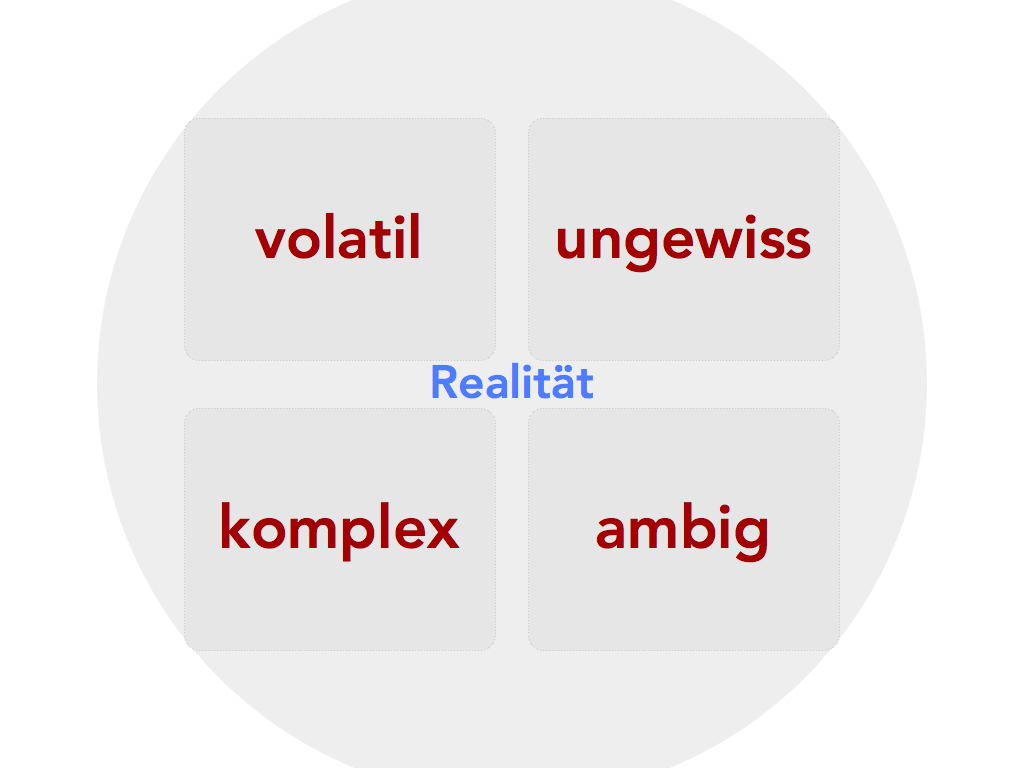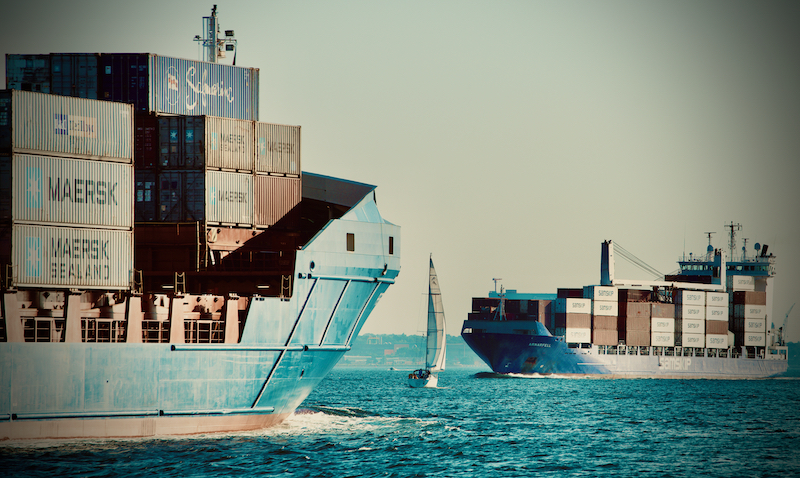The world is vuka! So what?!
It's no secret. The world is vuka. That's what it's called wherever strategy wants to be writ large, in business, science and somewhere in between.
The suspicion may creep in that a large-scale strategy process is no longer worthwhile: before you have finished it, the new one will already be starting anyway. The world will still be turning tomorrow. Perhaps differently. But who will notice? One change follows the next, one boss follows another, shareholders change too, even major shareholders – or else it comes to the end. uber, amazon and all this disruption.
Then it doesn't matter anyway, because it's all digital.
And this „then“ is perhaps already nowor was already yesterdaybut we haven't realised it yet. Maybe even the only ones. What's the point?! „Taxi! – I want to go home! “
VUKA is exactly that. An attempt to somehow describe this indescribable world. It is No solution concept for the overburdened. It is a Description concept for the experiencerswhose language tries to describe this environment as "insanely complex", "insanely fast" or simply "out of joint".
But What does that actually mean? we live in a VUCA world?
VUKA is an acronym of
- V-olatility or volatility
- Uncertainty or uncertain
- K-complexity or complex
- A-mbiguity or ambiguous.
Volatility
or What do I care about my gossip from yesterday?
Volatile means that the world also changes abruptly and extremely volatile, no longer just gradually, but from "now to the next" many things can be different. Well done to those who have taken precautions in such a world, who have, for example, reckoned with the possibility of an important customer cancelling, a supplier suddenly no longer delivering or some other unforeseen but not entirely improbable event that directly or indirectly affects their business model. Blessed are those who do not believe that their activities are irreplaceable.
The questions, what would we do in this (crisis) case and need for implementation, must provided in advance and clarified.
It's good for those who not only have financial leeway in the event of a business crisis, but also have the appropriate company websites such as "Questions and Answers" or "What to do now" already preconfigured. Of course, we also know a forerunner from the "old world": in every press editorial office, ready-made obituaries of people who are still very much alive are already slumbering "in the drawers", which today are of course hard drives. Of course, it is probably no coincidence that several biographies of Helmut Schmidt, several hundred pages long, have now hit the bookshops. Their completion is almost certainly the result of a „waiting process“ or rather Anticipation process. We're all dying, although some people weren't so sure about Helmut Schmidt…
In view of the volatility of the world, it is important to maintain room for manoeuvre, to expand one's own options and not to find oneself in a position where only one decision is possible. Agility must be the goal in a volatile environment. It is not always easy to distinguish agility from inconsistency or opportunism, thin board drilling, etc. Above all, agility is a sign of flexibility and acceptance of the changeability of the environment. Heinz von Foersterthe most radical constructivist, said that one must decide in such a way that one's Always expanding possibilitiesinstead of narrowing. He was right.
Uncertainty
or the accepted ignorance of uncertainty
Uncertainty means that no one can make reliable statements even about their own areas. Neither politics, science nor economics can make accurate predictions, even about small areas. Not to mention the big ones.
„All in all, Your Majesty, the failure to foresee the timing, extent and severity of the crisis [of 2008] and to avert it…was primarily a failure of the collective imagination of many smart people…“, This was the answer given by 33 experts from the British Academy to Queen Elizabeth on 22 July 2009 when she asked: „Why did nobody see the credit crisis coming? (quoted from Rödder, 21.0, p. 62, 2015)
Of course, not being able to demand concrete answers from anyone creates uncertainty. Some also understand the U in VUKA as uncertainty. Uncertainty arises directly when causal relationships are known, but it is unclear whether they will also apply in a specific case. For example, the responsibility of politicians in a particular case is clear, but it is unclear whether they will successfully fulfil this responsibility. There is uncertainty in this respect. Uncertainty in the sense of VUKA, however, refers to the experience situation where it is completely unclear who exactly is responsible for what – and no one can say with certainty. The U in the VUCA concept attempts to capture this uncertainty regarding the causal chains. It is often fatal that we always assume that more information would help to reduce the uncertainty. But this is only partially true. Because we are We are not fully able to categorise the relevance and meaning of new information because we have not yet understood the rules of the new context. The call for "more information" may sound good and logical, but it is a chimera. Information is data from which meaning has been wrested. The context of the data is important for this, which, if not understood, also leads to incomprehensible or inadequate information.
In our example, this would mean that someone says for sure who is responsible for the problem. However, we cannot say with certainty that this person is right or that their opinion is significant (for us or others). Perhaps others have already claimed otherwise. And we don't know the rules for categorising this information according to its accuracy. We live in uncertainty. And trust is necessary. With risk.
What is needed in uncertain worlds is two things: The uncertainty that is also created endure and expand your personal ability to wait.
It is said that there are two stupid reactions in the face of a concrete danger: Those who think they have to do something and those who think they don't have to do anything.
The The key to dealing with uncertainty is to delete the word must. It leads to a Attitude of the committed composure or optionally also serene commitment.
However, this only concerns how we deal with the uncertainty that is sometimes caused, but not how we deal with the underlying uncertainty, of which it has been said that simply "more information" does not necessarily help here either. What matters is the quality of the information and this depends on the way in which we obtain it. It's not about more knowledge, but about tested knowledge, knowledge from tests. In the dark, we feel our way forward step by step, we test in small steps and measure what happens. We move forward within visual range so that Mistakes do not lead to disasters, but to corrections lead. To do this, we need a constructive error culture and a suitable approach. So far, we have not found a better representation of this than at Eric Ries' 'Lean Start up! found. A must-read for acting in uncertain contexts!

Complexity
or why does nobody see through here anymore
Complex means that the effects cannot be calculated in advance, nor can they be traced back to their causes afterwards. The system under consideration, which can also be the environment, is too complex to be analysed in terms of how it works.
The The system is neither predictable nor predictable. The interplay of the individual elements remains „hidden“, their 'communication' a mystery, but their interdependence „obvious“. It can perhaps still be stated that self-reflexive feedback exists and thus any chance of a process being repeatable is ruled out. The system no longer returns to its original state, but is now a different one. There are no factory settings, no zero hour, no starting point and no end point. The system learns. And, insofar as it operates with meaning, it is, like us, virtually condemned to learn. Learning can also be interpreted as an attempt to establish a routine, but for complex systems it remains an unsuitable attempt. Nobody steps into the same river twiceHeraclitus already remarked that both the river and the swimmer are different.
What does this mean for the Acting in complex environments? Firstly, only limited conclusions can be drawn for the future from what has been observed. From the observation of cause and effect, we should Do not prematurely deduce causalities. In complex systems, it is a coincidence when they repeat themselves. Secondly, complex systems are best approached on the basis of their own complexity. Acting in complex environments requires you to recognise the maintain its own complexity - and to endure. Nothing is easy, and certainly not yourself. System and environment can mirror each other! Simple tools and simple solutions are often not enough to establish appropriate solutions. Even if there are enough "stories" that suggest the exact opposite, they are regularly based on cognitive shortcuts. Just as every strict teacher believes that his or her reprimands have a linear causal effect that the pupil will be better at the next attempt. But that is of course rubbish. Of course, it is also rubbish if the praise fetishist believes that his benevolence is linearly causally responsible for what the praised person does afterwards. We are indeed connected, networked social beings, but not with iron bars that would turn our movements into a zero-sum game: My going, causes your going back.
We endeavour to join the causal chains of the world in order to somehow feel our effectiveness and show it to others. That is human. But it is less influential than we think. In complex environments, we should be much more aware of the nature of co-operation, both in creating and solving problems. In this way, we would regularly encounter the world more appropriately.
In the Strategic dialogues It is therefore particularly important not to become rashly „technical“, to routinely use the instruments of the past, but to once again engage anew with this seemingly crazy world. Complexity requires committed Dialogues, less discussions and debates, but the Bringing together our complexities and differenceswhich then lead to joint solutions and cooperative approaches.
Ambiguity
or we will never give up.
Ambig is a A world full of ambiguitieswhich are also contradictory (ambivalent) can be.
An example from the business world shows the opposing, contradictory and sometimes paradoxical tendencies: both massification tendencies and exclusivity tendencies exist simultaneously for certain products. Both strategies can be successful. At the same time. We see this in meat consumption…on the one hand „ever cheaper“, on the other hand „ever more expensive“. Or take the trends on the stock market: Apple, at the time of its record-breaking earnings quarter, is on a downward spiral on the stock market.
Of course, the descent begins at the peak. Where else would it start?
It is important to recognise these emerging Accepting paradoxes and to act with them, to keep our distance in order to maintain an overview. Paradox management, dealing with recognised contradictions, is just as important as the ability to recognise ambiguities in the first place and allow them to exist instead of cognitively blocking them out because they disrupt our need for harmony. Ambiguity tolerance That's what it's called and it belongs right here.
What to do in the VUKA world?
There is a danger here of quickly unpacking the tried-and-tested recipes and relying on them: A volatile environment is just a question of having a clear vision! That's it. The world has only just been ascribed complexity when the linear solution instruments are already spilling out of one's own toolbox a'la "it's actually quite simple…you just have to…". Or the world is levelled out in its diversity by overemphasising "the actual problem…" against all others and only working on it.
And this is precisely the challenge that starts with us, not with the world out there! We need to train our perception for the unknown. We are so cluelessly safe.
Was the crisis recognisable beforehand? Yes, it was, if we look at the "weak signals" would have heard and interpreted. However, these compete with the "strong signals" in day-to-day management and regularly lose out, so that all work energy is focussed on the loud areas. But how do you deal with "weak signals" that you haven't even noticed yet?
Can we assume that they exist? Does the falling tree in the forest make noise if nobody hears it?
Dealing with the VUKA world
How do we in the Strategic dialogue with the VUCA world?
We prefer:
Campfire atmosphere: In the group, we promote the Retrospectiveswork on different paths to develop a Group narrative in the triad of Yesterday-Today-Tomorrow - the people create a group spirit! Team development 'en passant!
Utilising what is available: We avoid frontal and guru teaching and minimise any kind of knowledge transfer - There is sufficient knowledge in the group!
Interested vision: We activate a joint exchange of experience - the The otherness of others becomes comprehensible!
Group reflection: We are Reflection motors - The quiet, individual sounds become audible!
Diversity of perspectives: We never work alone in strategic dialogues, so that we can take into account the differences as well as the Transparently exemplify uncertainties and ambiguities - and use the model to show how we deal with this in our work.
All this together offers No ready-made solutions, but the best prerequisites for that.





Leave A Comment